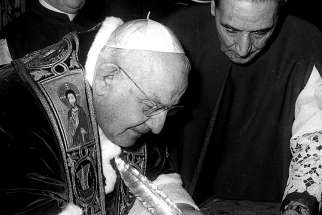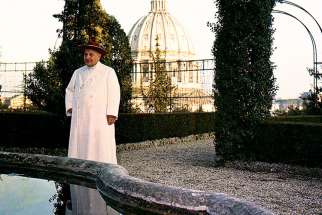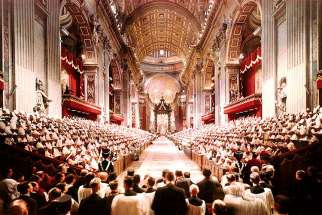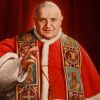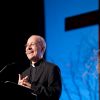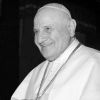Editorial: Taxes must be fair
Short pontificate left a long legacy
VATICAN CITY - A plump, elderly, smiling Italian of peasant origins, Pope John XXIII brought a humble yet charismatic, personal style to the papacy. He placed great importance on his modest upbringing in a village about 40 km northeast of Milan, saying: “I come from the country, from poverty,” adding it was a “happy and blessed poverty — not cursed, not endured.”
Pope John XXIII often skirted protocol
VATICAN CITY - Blessed John XXIII struggled to shake off many formalities that came with the papacy and often conspired with his valet to sneak out of the Vatican.
Calling Vatican II was an act of faith
VATICAN CITY - Blessed John XXIII called the Second Vatican Council in the conviction that it was necessary for the Catholic Church, yet without pre-conceived ideas of what it would accomplish, said Vatican II participants who recalled the event half a century later.
A better Church
Fifty years ago this week the largest gathering of bishops ever assembled heeded a call from Pope John XXIII to attend the opening of the Second Vatican Council.
It was a remarkable event. Each time the council was in session between 1962 and 1965 more than 2,000 bishops were present. They came from all corners of the world and, in sheer numbers, they were triple the total number of bishops (almost entirely European) who attended the First Vatican Council a century earlier. The Catholic world had never seen anything like it and, in many regards, Catholicism has not been the same since.
The Church today is better because of Vatican II. It’s not perfect, far from it. The task of interpreting and implementing the council’s 16 documents is ongoing. But Vatican II wasn’t a quest for perfection. It was about spiritual renewal and Christian unity in a post-war world on the cusp of extraordinary social, economic and technological revolution. Space flight was turning our thoughts to the heavens and Pope John sought to ensure God’s place on that journey.
“It is not that the Gospel has changed,” the Pope said at the time. “It is that we have begun to understand it better . . . the moment has come to discern the signs of the times, to seize the opportunity and to look far ahead.”
Vatican II lasted three years (with a nine-month hiatus after Pope John’s death in 1963) and the Church did indeed emerge spiritually invigorated. But, regrettably, not totally united. Considerable disagreement remains between those who say the council went too far and those who say it didn’t go far enough, between those itching to hit the rewind button and those longing to push fast forward. That disagreement won’t blacken the golden anniversary celebration but, unfortunately, it could soften the glow.
This issue of The Register devotes eight pages of special coverage to Vatican II but barely skims the surface of those historic days. What’s important to note, however, is that Vatican II was about evolution of Church practices, not revolution of Church doctrine. The council produced no radical doctrinal break with the past but, in keeping with Pope John’s intent, it emboldened the bishops to be future-looking.
The past half century has witnessed a whirlwind of social, scientific and economic innovation that, today, regularly pits society’s shifting values against the Church’s fundamental teachings. It might be a stretch to suggest Pope John saw all this coming. But he sensed something was up. The Second Vatican Council was the fruit of that foresight.
But, in the words of Winnipeg Archbishop James Weisgerber, it could take 100 years to fully understand all the implications of Vatican II. It’s a journey and we may only be half way there.
We rejoice the triumph of the Lord Jesus Christ
“Gaudet Mater Ecclesia! Mother Church rejoices!”
On Oct. 11, 1962, Blessed John XXIII opened the Second Vatican Council with that famous allocution. This year, his successor will return to the Vatican basilica to commemorate the 50th anniversary of the council. It is not only about looking backward though, for Pope Benedict XVI will simultaneously open the Year for Faith, in which the whole Church will be asked to discover anew her faith in Jesus Christ.
Ten years ago on Oct. 11, I was at St. Peter’s and had the privilege with some of my classmates to offer the Holy Mass at the altar over the tomb of Blessed John XXIII himself. The principal celebrant that day was Archbishop Timothy Dolan, then the archbishop of Milwaukee, who had been the rector of the Pontifical North American College when I and my classmates were students there. The then rector, Msgr. Kevin McCoy joined us, as did friends of Archbishop Dolan. More than that, the day was especially memorable as my own parents were present.
At the space of then 40 years — and now 50 — Oct. 11, 1962, manifestly marked out a new path for the Church in the history of our time. That path has not been without twists and turns, successes and disappointments, as mark the Church’s pilgrimage toward the Lord of history. Most fundamentally, the council remains what it was from the beginning, a summons to proclaim with new missionary fervour the Gospel in our time.
“Gaudet Mater Ecclesia captured the spirit of the Council and the spirit of the pope who convoked it,” the preacher, a newly ordained priest, said that morning 10 years ago at the tomb of that very same pope. “Those resonant words are an answer to the question: What does the Church do?
“The Church rejoices. It is her mission. It is what she exists in the world for. To rejoice. She rejoices because she knows, as St. Paul teaches us, ‘that through Christ Jesus the blessing bestowed on Abraham might descend on the gentiles in Christ Jesus.’ She rejoices because the promise made to Abraham is fulfilled in Jesus Christ, her Bridegroom, her Saviour, her Redeemer, her Lord. The Church rejoices because of the ‘wondrous deeds’ of the Lord. ‘Great are the works of the Lord, exquisite in all their delights,’ sings the psalmist.
“Pope John XXIII chose this date to open the council because it was the feast of the divine maternity of Mary,” the homilist noted. “When that feast was moved to Jan. 1, Oct. 11 became free and was given to Blessed John XXIII, in memory of his most memorable words, spoken here in this basilica, only a few feet from where we are this morning: Gaudet Mater Ecclesia! His feast and this anniversary are truly an exquisite delight from the Lord.
“In that landmark address of Oct. 11, Pope John gave us several memorable phrases, warning us against the ‘prophets of gloom’ and inviting the Church to show the ‘medicine of mercy.’ Yet there is one passage that speaks to the heart of the council’s message and heart of Angelo Roncalli’s life, words that echo today’s Gospel: The great problem confronting the world after almost 2,000 years remains unchanged. Christ is ever resplendent as the centre of history and of life. Men are either with Him and His Church, and then they enjoy light, goodness, order and peace. Or else they are without Him, or against Him, and deliberately opposed to His Church, and then they give rise to confusion, to bitterness in human relations and to the constant danger of fratricidal wars.”
The joy which Blessed John XXIII proclaimed 50 years ago was not about pasting a smiley face on the Church so as to make her more popular. The Church rejoices because Jesus Christ has triumphed, and that His love is stronger than all the principalities and powers of the world arrayed against Him.
Today, more than 50 years ago, there are still many — likely a majority in Canada now — who are without Jesus, against Jesus or even deliberately opposed to His Church. The damage they wreak is great. The consequences of their decisions have grave consequences in this world and the next.
There are so many apart from Christ who bring to our common life so much sadness and wickedness, and even a metaphysical boredom that can be worse. Precisely for this reason does the Church need to bring the world joy — 50 years after the council, 50 years from now, and forever after that. Gaudet Mater Ecclesia!
Jesuit Father James (Jim) Martin is quickly becoming one of my favourite religious writers and orators. And the more I read of his works or watch his talks on TV and the Internet, the more impressed I become.
This American Jesuit thinks clearly, speaks and writes directly, and best of all, he is funny, although he has serious messages. (He is the official chaplain of Comedy Network’s The Colbert Report where he sometimes appears.) He is a populist who endeavours to make Catholicism ever more popular.
If you’re looking for summer reading, Fr. Martin has several best-selling books, including My Life With the Saints, A Jesuit Off-Broadway: Centre Stage with Jesus, Judas and Life’s Big Questions, and the Jesuit Guide to Almost Everything.
Blessed John XXIII's 'Pacem in Terris' is model for preaching, teaching, archbishop says
VATICAN CITY - As the Catholic Church increases its new evangelization efforts and works for justice and peace in the world, it would be wise to imitate the positive, prophetic approach taken by Blessed John XXIII in his encyclical "Pacem in Terris," a French archbishop said.
Archbishop Roland Minnerath of Dijon addressed the opening session April 27 of a meeting of the Pontifical Academy of Social Sciences, which was holding the second of three planned meetings preparing to mark the 50th anniversary next year of "Pacem in Terris," the encyclical "on establishing peace in truth, justice, charity and liberty."
D&P is a sign of faith in Canada and globally
They were exciting times. Pope John XXIII, just months after being elected as Pope, called for an Ecumenical Council. The sorrows, suffering, hopes and joys of the human family were to be those of the Church as well. Bishops, theologians and others from all over the world gathered in Rome from 1962-65 to debate the issues of the day and their relationship to the faith and sacramental life of the Church. One could almost say that the Church saw herself now as part of a global village.
Pope John XXIII also asked the Church of the global north to be concerned about the struggles of the global south. Many religious orders and dioceses responded. These were inspirational times and brought the issues of the human family world wide into the consciousness of Catholics here in Canada


